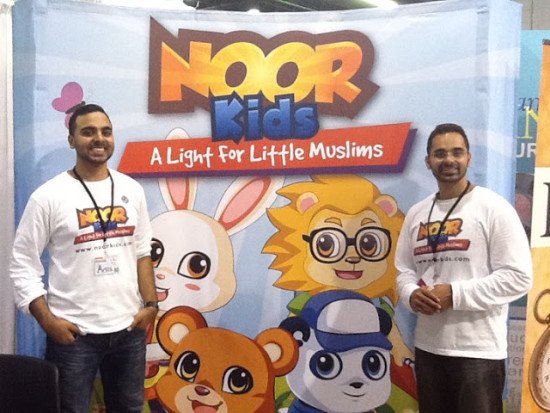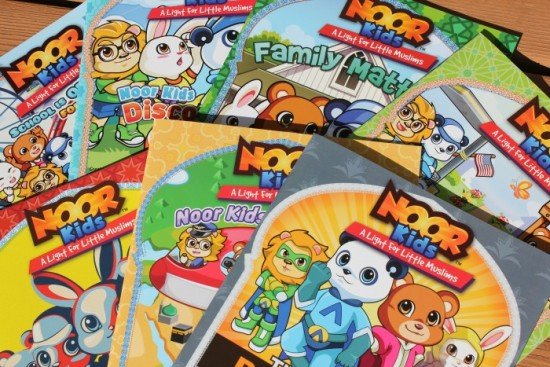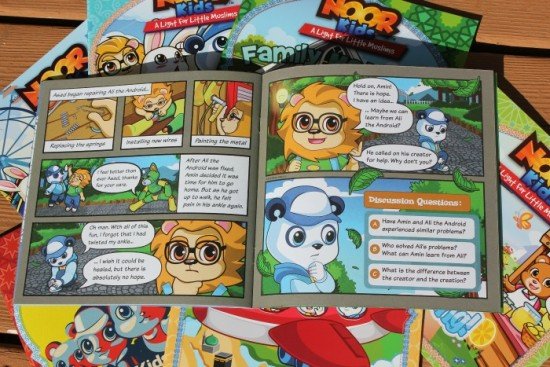[Interview] Amin Aaser on what inspired him to create Noor Kids: America's fastest growing Islamic children's book series
 “A light for little Muslims”, Noor Kids is an insightful, innovative and fast-growing Islamic children’s book series created by brothers Amin and Mohammed Aaser. From growing up in North America and losing confidence in his own Islamic identity, Amin was inspired to ensure that the next generation of young Muslims grow up with confidence, inspiration and quality Islamic entertainment. Through its engaging and relatable content, colorful characters and quality design, Noor Kids is now the fastest growing Islamic children's book series in America, and appeals to young people and their parents because of its universal themes and messages.Meet Amin from Noor Kids and find out which events inspired him to create Noor Kids, what challenges the Muslim youth might face today, and how Noor Kids will help Muslims re-engage with their Islamic identities.
“A light for little Muslims”, Noor Kids is an insightful, innovative and fast-growing Islamic children’s book series created by brothers Amin and Mohammed Aaser. From growing up in North America and losing confidence in his own Islamic identity, Amin was inspired to ensure that the next generation of young Muslims grow up with confidence, inspiration and quality Islamic entertainment. Through its engaging and relatable content, colorful characters and quality design, Noor Kids is now the fastest growing Islamic children's book series in America, and appeals to young people and their parents because of its universal themes and messages.Meet Amin from Noor Kids and find out which events inspired him to create Noor Kids, what challenges the Muslim youth might face today, and how Noor Kids will help Muslims re-engage with their Islamic identities.
Can you tell us a bit about yourself?
The community that I grew up in Minneapolis, MN was monolithic. I was one of the few non-white, non-Christian people in my school. Poorly equipped to deal with such an environment, I began to feel weird among my peers. After September 11th, this feeling transformed into something much worse: shame. Time and again, I felt lowly in front of peers because of the faith in my heart. This experience forced me to reflect on faith, establish my belief, and reclaim my identity.After college, I had a great career working with some of the world’s largest businesses, 3M, Target, General Mills, and Cargill, in finance, marketing, and operations. However, my passion for identity and faith forced me to reconsider by career path. I’ve recently left my career to study faith-based social enterprises at Berkeley.
Why did you create Noor Kids? How did you create it?
We wanted to solve a problem: how can we make sure that little Muslims, growing up in a challenging environment, still maintain confidence in their religious identity? This has much to do with my personal story above… I wanted to ensure that other children don’t experience the same situation that I had.After researching at Harvard University, we discovered three key items: (a) role models, (b) parents, and (c) critical thinking.(a) Role Models: In order for kids to feel normal and build a constructive identity, they must have role models. One form of role model is a character – like Dora the Explorer. These role models help children develop a constructive identity. Further, when kids see themselves in the media that they consume, they feel normal – as if they are just like everybody else.
“My passion for identity and faith forced me to reconsider by career path. I’ve recently left my career to study faith-based social enterprises at Berkeley."
(b) Parents: When kids build a strong relationship with their parents, especially at a young age, it plays an important role in the development of a strong identity. Further, when parents discuss faith with children, we believe it helps children build a stronger relationship with faith as well.(c) Critical Thinking: Because children are growing up as a religious minority, it is important that they understand the rationale behind their beliefs. It is not just important what they believe; rather it is also important for kids to understand why they believe it.We bundled these learnings together to create Noor Kids Islamic children’s books.Noor Kids is an Islamic children’s book series that seeks to build confidence in the religious identity of 3 to 8 year old Muslims around the world. We have developed four characters – Amin, Shireen, Asad, and Amira – to engage children with Islamic education, Muslim culture, and American integration. Alhumdulillah, we now have eight books that have entered into over 25,000 homes across the world.
What kind of challenges do you feel the Muslim youth face today - and how will Noor Kids help them to re-engage with their identities?
In my estimate, the challenges faced by our key demographic – 3 to 8 year olds – remains unchanged since our inception. However, for older Muslims – between the ages of 15-24 – I believe there are a couple of issues that persist:(a) Social Acceptability: Over ten years after 9/11, discrimination towards American-Muslims is at an all-time high. A recent report indicated that employers are less likely to hire American-Muslims than any other religious group, and further, a significant amount of American prefer not to have a Muslim neighbor.Why would any youth want to put himself or herself through these struggles? In my estimation, it is likely the most challenging time to ever grow up as an American-Muslim in the United States.(b) Extremism: For those youth who decide to remain steadfast in faith, the growing ultra-conservative brand of Islam is a troublesome threat. Recent reports have indicated that Muslim youth have gone so far as to fight in Syria and Somalia alongside ISIS and al-Shabbab.At first, I had thought that this threat was over-hyped. However, when I witnessed such ideologies first-hand among Muslim youth in conversations around the country, I have become more concerned.
“It is important that kids understand the rationale behind their beliefs. It is not just important what they believe; rather it is also important for kids to understand why they believe it.”
(c) Sectarianism: While Muslims are a minority in the US, representing less than 5% of the total population, instead of working together to build coalition, the community seems more divisive than ever. This trend mimics a global issue among Muslims populations globally, in which sectarian conflict across the world – Iraq, Syria, Pakistan, Burma, and Indonesia to name a few – has escalated.For Noor Kids, the challenges listed above are beyond the scope of our mission. However, we believe that by helping children plant the seeds of akhlaq (character) at a young age, we believe that a constructive identity will take root and ultimately lead to long-term success, isha’Allah.
What is the process of creating a story?
We take a sophisticated approach to story-telling. First, by developing a thesis. Second, by researching Islamic archetypes. And finally, by developing a modern plot.Each of our books is the product of months of research, in which we dive into concepts – such as gratitude, honesty, and patience. After researching these characteristics through both Islamic and secular texts, we develop a synthesized thesis statement, which appears on the “Parents Page” in each book. This thesis essentially becomes the goal of our book: to allow children to internalize this message through the stories we share.
“By helping children plant the seeds of akhlaq (character) at a young age, we believe that a constructive identity will take root and ultimately lead to long-term success.”
After developing the thesis, we then look for Islamic archetypes, or stories, from the life of the Prophet (SAW) and the Holy Qu’ran. For example, if there is a story regarding jealousy, we will perhaps look to the story of Prophet Yusuf (SAW) and his brothers. We use these archetypes to inform the plot of the stories which we develop.Finally, we use our own creativity to create a story based on the archetype. In the stories, we use the Noor Kids characters and also create a more relatable setting such that children can easily appreciate and internalize the message.
What challenges did you face with Noor Kids, and how did you overcome them?
I love Noor Kids. I love having the opportunity to work on it and the ability we have to change lives. The two challenges are regarding scale and operations.In order for us to continue working on Noor Kids long-term viably, we have to enter into more homes. It is necessary that we take our current organization and scale it such that we can increase our reach around the world.Further, we’ve received orders from over 25 countries internationally. And in fact, we are now at a point where we’ve basically run out of books. We have to think very diligently about how we will run our operations in the future… we are a relatively small organization that is selling books around the world.We haven’t answered these two questions yet, but inshallah over the coming months we will.
Last but not least what do you think of Sufi Comics?
I’m a big fan! I am especially excited about the ability that Sufi Comics has to introduce people to Islam. In my experience, the likelihood of somebody picking up an “Islam 101” textbook is zero. However, we frequently have non-Muslims pick up Noor Kids books and learn that Islam preaches many similar messages as Christianity, Judaism, and other religions. In the same way, I believe that many non-Muslims can learn even more about Islam through creative works, such as Sufi Comics.Keep up the excellent work!
Check out the Noor Kids website and a free preview here!Stay updated with all the latest by following @NoorKids on Twitter
Read our previous interviews with creative artists here
Sign up to our Sufi Comics: Rumi pre-launch list for an exclusive preview of the new book

